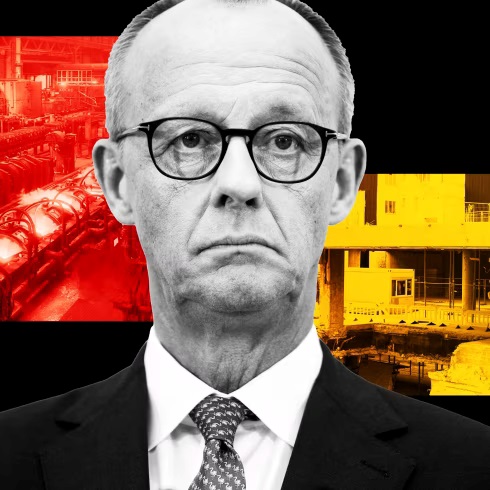 Friedrich Merz
Friedrich Merz
Photo-montage FT/AP
Since assuming office in May, Chancellor of Germany Friedrich Merz has projected a newfound sense of German assertiveness abroad, travelling to Kyiv and Washington to shape Europe’s response to Russia’s war on Ukraine and to Donald Trump’s trade tariffs. But at home, with the economy still mired in its longest period of stagnation since the second world war, the Christian Democratic leader is facing an impatient and sceptical nation, ‘Financial Times’ notes.
Merz is not the only leader navigating a weak economy and a fraught political climate; both the UK’s Keir Starmer and France’s Emmanuel Macron are grappling with similar, if not more serious issues. But many hope Berlin’s new government — with its loosened purse strings and tradition of compromises — can yet deliver an antidote to the populism and economic turbulence rising across Europe.
Merz campaigned on a promise to reform Europe’s largest economy, which has ground to halt for the past three years and is shedding industrial jobs at fast pace.
The 69-year-old dubbed his economic plan “Agenda 2030”, a nod to Gerhard Schröder’s “Agenda 2010” — the labour market reforms of the former Social Democratic (SPD) chancellor that helped transform Germany in the 2000s from the “sick man of Europe” into an export powerhouse. The plan signalled political courage to pursue contentious measures even if they could prove electorally damaging.
Since his party’s victory in February’s federal elections, however, the reality of coalition politics has set in. Merz formed a government with the SPD, which has disowned the Schröder legacy and campaigned on a big-spending plan to stimulate the economy. He presented the alliance as the centre’s last chance to halt the rise of the far-right Alternative for Germany, which secured more than a fifth of seats in the Bundestag.
Overcoming his party’s reluctance for public debt, Merz devised a Keynesian spending plan unseen since reunification. Identifying Vladimir Putin’s Russia as the biggest security threat to Europe and alarmed by Trump’s desire to disengage from Nato, he struck a deal with the SPD and the Greens to relax the constitutional borrowing cap, introduced under former chancellor Angela Merkel, to upgrade the German armed forces. In exchange for SPD support, he agreed to borrow an additional €500bn over the next 12 years to repair Germany’s crumbling infrastructure.
The economy shows few signs of revival
Households and companies would feel an uplift “by the summer”, Merz declared.
Nearly six months on, the economy shows few signs of revival and frustration is mounting. The Munich-based Ifo Institute expects GDP growth of just 0.2 per cent this year, followed by a modest rebound to 1.3 per cent next year thanks to public spending. After a brief spell of optimism, business sentiment has slumped again, and industrial woes have deepened. “Any glimmers of hope that had emerged among capital goods manufacturers have faded,” Ifo noted.
Meanwhile, the AfD has climbed to about 25 per cent in national polls. Last month, the party, classified as “far-right extremist” by intelligence agencies, tripled its vote in municipal elections in North Rhine-Westphalia, Germany’s most populous state, making inroads into the SPD’s industrial bastions of the Ruhr valley.
“He has been travelling a lot, but that is not what he was elected to do,” says Andreas Busch, a political scientist at Göttingen university. “Alongside migration, the economy was the main issue for voters — they are still waiting.”
Merz has defended his travels as a matter of “war and peace”, saying that foreign and security policy along with economic policy could “no longer be separated from each other”.
Disquiet runs deep even in wealthier, traditionally conservative regions, home to many of the country’s small and medium-sized Mittelstand companies. In Paderborn, a CDU stronghold of 150,000 people in North Rhine-Westphalia, a Benteler factory hums with life, emitting fumes and loud bangs as it shapes red-hot steel tubes and other components for the car industry. Founded in 1876 and still family-owned, Benteler is the city’s largest employer. But Thomas Michels, a top executive in the company’s steel division, is today fighting an existential storm.
Core German industries are shrinking, he laments. German steel output declined 12 per cent in the first half of this year compared with last year. And car manufacturing plants, which produced nearly 6mn vehicles in 2017, three-quarters of which were for export, now produce 4mn. A pick-up in defence production is unlikely to compensate fully, he says: “A tank is not a consumer product — it’s a deterrent. You build one and that’s it.”
“People used to say you could just put a broomstick on the square, paint it black – that is no longer true”
Paderborn, a quiet Catholic city founded in the 8th century by Charlemagne, has been governed by the CDU for nearly eight decades. But for the first time in its postwar history, during local elections last month, the party’s mayoral candidate was forced into a run-off round with the Green party candidate after losing votes to the AfD.
“People used to say you could just put a broomstick on the square, paint it black [the colour of the CDU] and people would vote for it,” says Stefan-Oliver Strate, the newly elected CDU mayor. “That is no longer true.”
Strate, a political newcomer, had hoped to ride a wave of enthusiasm after Merz’s election. Instead of “a tailwind”, he says he felt “side and headwinds”. During his campaign, about one in 10 Paderborn residents he met complained to him about Berlin or Merz.
With a parliamentary majority of just 13 seats, the coalition’s tensions and lack of discipline are fuelling legislative uncertainty. The pressure will only mount on both coalition partners, with five federal states holding elections next year, including two former communist states — one ruled by the CDU, another by the SPD — which the AfD is predicted to win.
read more in our Telegram-channel https://t.me/The_International_Affairs

 10:36 04.11.2025 •
10:36 04.11.2025 •






















